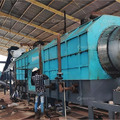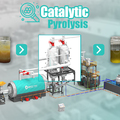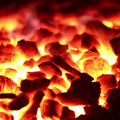In the vast landscape of sustainable materials, rice husk stands out as a versatile resource with remarkable potential. Often considered a byproduct of rice milling, rice husk has found a new lease on life as a key ingredient in rice husk charcoal making machine. In this exploration, we delve into the fascinating world of rice husk charcoal, unraveling its production process, environmental benefits, and diverse applications that go beyond the conventional.

Rice Husk: The Unsung Hero of Charcoal Production
A Byproduct Transformed
Rice, a staple food for a significant portion of the global population, comes with its own set of byproducts. Among these, rice husk is often overlooked and treated as waste. However, the ingenuity of sustainable practices has turned this seemingly insignificant byproduct into a valuable resource for charcoal production.
Abundant and Accessible
One of the key advantages of using rice husk for charcoal is its abundance. Rice is a major crop worldwide, and the husk is generated in large quantities during the milling process. This abundance makes rice husk an accessible and cost-effective raw material for charcoal production, paving the way for sustainable and economically viable solutions.
The Production Journey: From Husk to Charcoal
Pyrolysis Magic
The transformation of rice husk into charcoal involves a process known as pyrolysis. In simple terms, pyrolysis is the decomposition of organic materials at high temperatures in the absence of oxygen. In the context of rice husk, this process involves heating the husks to a certain temperature, causing them to release volatile compounds and leaving behind a carbon-rich residue – the coveted rice husk charcoal.
Sustainable Energy Production
What sets rice husk charcoal apart is its potential for sustainable energy production. The carbon content obtained through pyrolysis makes it an efficient and clean-burning fuel. The controlled combustion of rice husk charcoal not only minimizes harmful emissions but also harnesses the energy locked within the husks, providing an eco-friendly alternative to traditional fuels.
Waste to Wealth
The utilization of rice husk for charcoal production embodies the concept of turning waste into wealth. Instead of discarding the husks as agricultural waste, the process of converting them into charcoal adds value to what was once considered a byproduct. This not only reduces the environmental impact of waste but also contributes to the circular economy by creating a valuable resource from an otherwise overlooked material.
Environmental Guardianship: Rice Husk Charcoal's Green Credentials
Mitigating Agricultural Waste
Rice husk charcoal production plays a crucial role in mitigating the environmental impact of agricultural waste. Traditionally, rice husks were often burned or left to decompose, contributing to air pollution and soil degradation. By converting them into charcoal, we not only prevent the release of harmful substances into the atmosphere but also repurpose the husks for a sustainable and beneficial purpose.
Carbon Sequestration and Offset
The carbon footprint of rice husk charcoal is relatively low compared to traditional charcoal sources. The carbon released during the combustion of rice husk charcoal is part of the natural carbon cycle, as the rice plants absorbed carbon dioxide during their growth. This creates a carbon-neutral or even carbon-negative cycle, contributing to carbon sequestration and offset.
Soil Enrichment
Beyond its use as a fuel, rice husk charcoal has applications in agriculture. When incorporated into soil, it enhances its fertility and structure. The porous nature of the charcoal provides a habitat for beneficial microorganisms and helps retain moisture, contributing to sustainable and productive agricultural practices.
A Culinary Revolution: Cooking with Rice Husk Charcoal
Clean and Flavorful Cooking
One of the standout features of rice husk charcoal in the culinary world is its clean burn and minimal smoke production. Traditional charcoal can often impart unwanted flavors to food due to the presence of impurities. Rice husk charcoal, with its controlled combustion and high purity, ensures a clean and neutral burn that allows the true flavors of the ingredients to shine through.
Versatility in Cooking Applications
Whether it's grilling, roasting, or smoking, rice husk charcoal proves to be a versatile companion in the kitchen. Its even and consistent heat distribution makes it a favorite among chefs for a wide range of culinary applications. From searing steaks to slow-cooking delicate dishes, rice husk charcoal offers precision and control.
Sustainable Outdoor Cooking
For outdoor enthusiasts and camping aficionados, rice husk charcoal provides an eco-friendly solution for cooking in the great outdoors. Its lightweight nature and easy ignition make it a convenient choice for portable grills and stoves, ensuring that the joy of outdoor cooking is paired with environmental responsibility.
Beyond the Grill: Innovative Applications of Rice Husk Charcoal
Water Purification
The porous structure of rice husk charcoal makes it an effective material for water purification. When used as a filter, it can absorb impurities and contaminants, providing a simple and sustainable solution for clean water access. This application has significant implications, especially in regions where access to clean water is a pressing concern.
Building Material
Rice husk charcoal has found its way into the realm of construction materials. When mixed with other binders, it can be used to create lightweight and insulating building blocks. This not only utilizes a renewable resource but also reduces the environmental impact associated with traditional construction materials.
Industrial Applications
The versatility of rice husk charcoal extends to various industrial applications. It can be used as a raw material in the production of activated carbon, a substance with wide-ranging uses, including air and water purification, gas adsorption, and even medical applications.
Overcoming Challenges: Paving the Way for Rice Husk Charcoal Dominance
Technology Advancements
As the demand for sustainable alternatives grows, technological advancements play a crucial role in optimizing the production process of rice husk charcoal. Innovations in pyrolysis technology and equipment can enhance efficiency, reduce energy consumption, and make the production of rice husk charcoal even more economically viable.
Market Awareness and Education
The journey towards widespread adoption of rice husk charcoal requires efforts in market awareness and education. Many consumers may still be unfamiliar with the benefits and applications of this sustainable resource. Initiatives that promote awareness, provide information, and highlight success stories can bridge the gap between producers and consumers.
Policy Support
Governments and regulatory bodies play a pivotal role in creating an environment conducive to the growth of sustainable practices. Policies that incentivize the use of rice husk charcoal, promote research and development, and ensure responsible production practices can contribute to its mainstream acceptance.
Charting the Future: Rice Husk Charcoal as a Catalyst for Change
Community Empowerment
The adoption of rice husk charcoal presents an opportunity for community empowerment, especially in regions where rice cultivation is a significant part of the local economy. By creating value from rice husks, communities can benefit economically while contributing to environmental sustainability.
Global Collaboration
The potential of rice husk charcoal goes beyond regional borders. Global collaboration in research, technology transfer, and knowledge sharing can accelerate its adoption on a larger scale. By working together, nations can harness the benefits of rice husk charcoal to address common challenges related to waste management, energy security, and environmental conservation.

Sustainable Development Goals
Rice husk charcoal aligns with several Sustainable Development Goals (SDGs), including zero hunger, clean water and sanitation, affordable and clean energy, climate action, and life on land. Its multifaceted applications make it a valuable asset in the pursuit of a more sustainable and equitable world.
In Conclusion: Rice Husk Charcoal – A Beacon of Sustainability
As we navigate the complexities of a changing world, rice husk charcoal emerges as a beacon of sustainability. From its humble origins as a byproduct to its diverse applications in energy, agriculture, cooking, and beyond, rice husk charcoal exemplifies the transformative power of innovative thinking and sustainable practices. The journey from husk to charcoal is not just a technological feat but a testament to the harmonious relationship between humanity and the environment. As we embrace the myriad uses of rice husk charcoal, we embark on a path towards a greener, cleaner, and more sustainable future.





